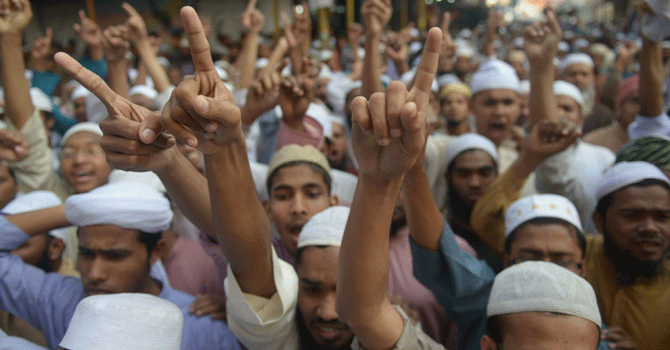Deobandi Islamist militancy in Bangladesh and counter-narrative – by Muhammad Nurul Huda
Source: Daily Star
A daily English newspaper took a dim view of the fact that the anti-militancy campaign has run aground and expressed concern as to why the imams of mosques reportedly refuse to give anti-militancy sermons to counter the extremist version. Extremism stemming from religious ideology is understandably the target of the national counter terrorism strategy that is being worked out. There is a presumption that we are yet to prepare an effective counter-narrative for combating religious extremism with a view to raising appropriate awareness, and that the deficit needs to be proved.
Upon scrutiny, one would find that a large number of the country’s imams belong to the Deoband school that promotes an uncompromising, puritanical and exclusive fundamentalism. It is relevant to note that the Deoband Madrasa, founded in 1866, denounced music and dancing and distanced itself from much that was progressive in Indian society; it shunned the British Law Courts and retained jihad as a central pillar of faith. The focus of this Jihad was “on the promotion of Islamic revival and identity through the principle of the immutability of Shariah, the oneness of God and the overarching, guiding authority of the Ulemah.”
Deobandism waged a ceaseless war of words against Shias, Hindus and Christian missionaries; it also caused the issuance of fatwas on almost all subjects, including declaration of activities of Syed Ahmed Khan of Aligarh as ‘un-Islamic’ and banning all Muslims from joining his Patriotic Association. This writer has a suspicion that our imams, being largely influenced by the doctrinal claims of Deoband school, tend to believe that the anti-militancy sermons are actually the handiwork of anti-Islam schemers prodded by the west. Hence, they display marked disinterest in the motivational programme. Such presumption, does not, however, preclude the suspected inertia of people in authority in properly arranging the communication session.
The imams, apparently, have good reason to suspect the motives of western establishment and their influence on our ruling class. Amongst other happenings, the loss of Palestine has become a potent symbol of the humiliation of the Muslim world at the hands of the western powers, who seemed to feel no qualms about the dispossession and permanent exile of hundreds of thousands of Palestinians. The European occupation has often left a legacy of bitter conflict as in India, or deliberate effort to control the economy after the independence as in the Suez Canal crisis.
An important issue is whether the authorities have been able to agree as to the contents of an historically credible and religiously correct counter-narrative to confront the Deobandi and Salafi/Wahabi extremists. Should we not project Islam as being just as rational as any western system? We should be able to demonstrate that Islam was and is the most rational and advanced of all the confessional faiths; that strict monotheism of Islam had liberated humanity from mythology. Our narrative could also emphasise that the empirical spirit that had given birth to modernity had in fact originated in Islam.
We need to project that Muslims have a vital mission to witness the divine dimension of life, not the retiring from the world to engage in contemplation or indulging in suicide-bombing, but by an activism that implements the social ideals of Shariah. We also need to realize that politics had never been a secondary issue for Muslims.
The counter-narrative needs to recognise that politics had been the theatre of religious quest of Muslims. Salvation for them does not mean redemption from sin, but the creation of a just society in which the individual could more easily make that existential surrender of his or her whole being that would bring them fulfillment. The polity for the Muslims was, therefore, an aspiration that required a jihad, a struggle that could find no simple outcome.
The counter-terrorism strategy’s narrative should be able to effectively dispel the misgivings about fundamentalism that gives the impression of its being a violent form of Islamic religiosity. It needs to be stressed that fundamentalism is a global fact and has surfaced in every major faith in response to the problems of modernity. In fact, of the three monolithic religions Islam was the last to develop a fundamentalist strain, when modern culture began to take root in late 1960s and 1970s. There is a need to clearly state that Deobandi and Salafi/Wahabi extremists do not represent the majority of Sunni Muslims, nor do they represent the core, peaceful message of Islam.
The struggle to enshrine the Islamic ideal in State structures and to find the right leader has preoccupied Muslims throughout their history. The notion of true Islamic state is difficult to perfectly express in human form and perhaps will elude the grasp of flawed human beings. Secular rationalism of modern culture poses special problems for people in all the major traditions. Therefore, it must not willy-nilly appear determined to wipe religion out. The vast mass of the people want to be modern and religious.
http://www.thedailystar.net/op-ed/militancy-and-counter-narrative-13140


Deobandi Islamist militancy in Bangladesh and counter-narrative – by Muhammad Nurul Huda – See more at: https://lubp.net/archives/306833
The footprints of Deobandi militant jihad in India and Pakistan – by Maloy Krishna Dhar – See more at: https://lubp.net/archives/307525
بریلوی مسلک وہابی-دیوبندی نظریاتی یلغار کے نشانے پر ہے -برطانوی اخبار گارڈین – See more at: https://lubp.net/archives/302091
A research article on differences and similarities between Deobandis and Salafis/Wahhabis – See more at: https://lubp.net/archives/280211
Role of Khan Abdul Ghaffar Khan in the spread of Deobandi ideology in Pashtuns – See more at: https://lubp.net/archives/306211
Historical context and roots of Deobandi terrorism in Pakistan and India https://lubp.net/archives/306115
This website is my aspiration , extremely fantastic pattern and perfect articles .
nike air zenyth femme http://www.gpscoordinates.eu/tempo/profile.php?pid=9457